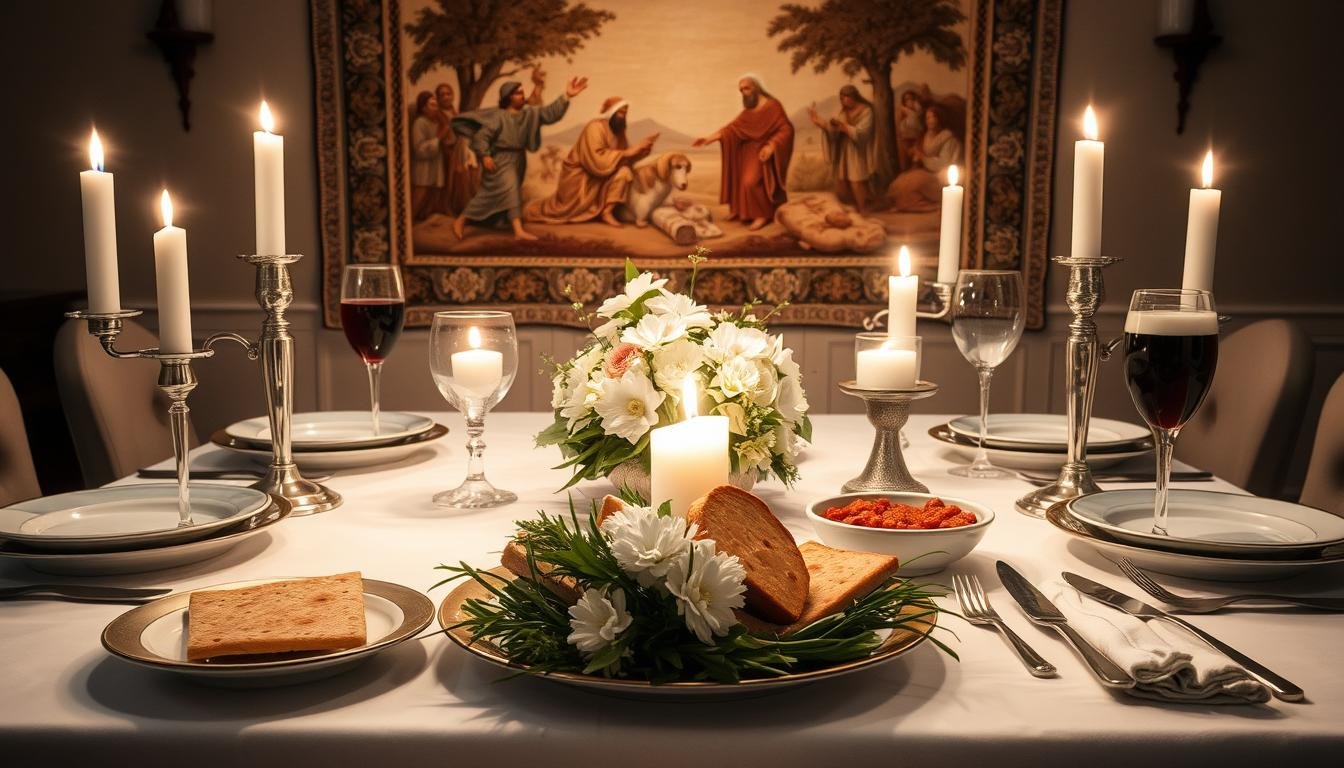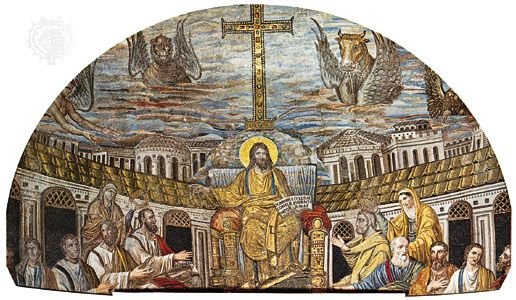Have you ever thought about how Passover fits into the Christian faith? Can Christians Celebrate Passover? This question starts a deep look into the history and spiritual meaning of this ancient Jewish holiday. Early Christianity grew out of Jewish traditions, making Passover a key part of Christian beliefs. It’s a mix of customs that blend with Christian beliefs.
This article will explore how Passover is important for Christians. It looks at how it can deepen their faith and tradition. We’ll see how the Passover story’s symbols and modern Christian practices connect. Does celebrating Passover really strengthen our faith?
Understanding the Biblical Significance of Passover
Passover is a key event in the Bible, found in the Old Testament. It celebrates when God saved the Israelites from slavery in Egypt. The story of Passover shows God’s power and care for His people.
The Historical Context of Passover in the Old Testament
The story of Passover is in the book of Exodus. It tells how the Israelites suffered under Egyptian rule. God told them to mark their doors with lamb’s blood for salvation. This saved their lives and reminded them of God’s promise.
Passover as a Foreshadowing of Christ
In Christianity, Passover hints at the coming of Jesus Christ. The lamb from the first Passover represents Christ, the “Lamb of God” who would save humanity. This link deepens Passover’s meaning for Christians, connecting it to the New Testament.
The Origins of Passover Celebration
The story of Passover goes back to a key event in Exodus. God gave the Israelites clear instructions on how to celebrate their freedom from slavery. This event changed the course of Jewish history. It also set up rituals that are still honored today.
God’s Instructions to the Israelites in Exodus
In Exodus, God told the Israelites to keep Passover as a way to remember their freedom. They had to sacrifice a perfect lamb and mark their doors with its blood. This showed their faith and was key to their escape from Egypt.
These instructions asked them to recall God’s kindness and help. They highlighted the value of Jewish traditions rooted in their shared past.
The First Passover and Its Meaning
The first Passover was a key moment for the Israelites, marking their freedom from slavery. It started a tradition that celebrates salvation and divine protection. The use of unleavened bread reminds us of their quick departure from Egypt.
Every part of the Passover ceremony adds to its deep meaning. It’s not just a historical event but also a spiritual journey. This tradition touches the Jewish community and people around the world.
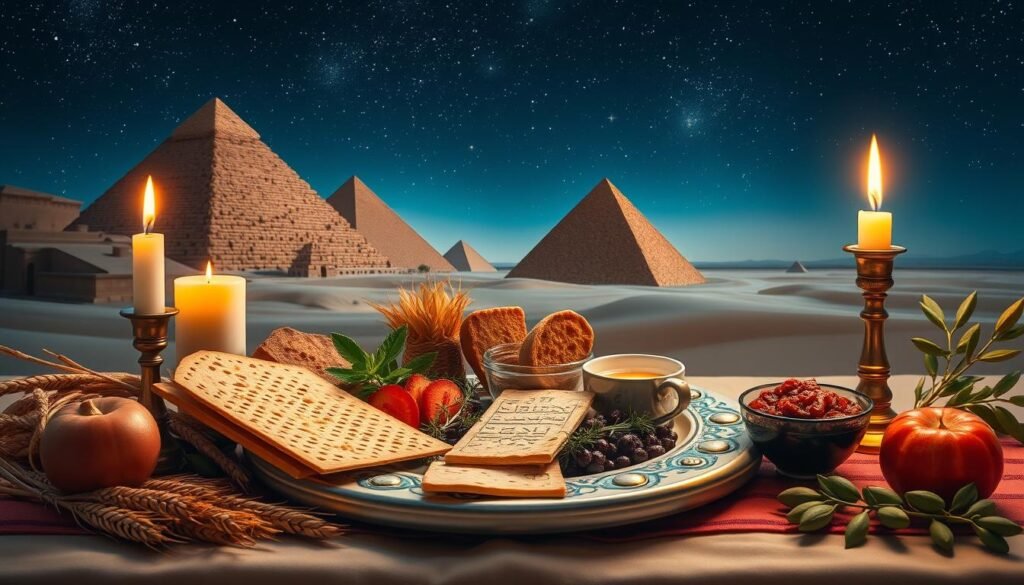
Can Christians Celebrate Passover?
Christians can choose to celebrate Passover based on their beliefs and personal feelings. Some see it as a way to honor the past and connect with their faith. Others might not celebrate, believing Jesus’ sacrifice is enough.
Romans 14:5 talks about making these choices. It says we are free in our beliefs.
Personal Choice and Spiritual Significance
Many Christians see Passover as a chance to think about Jesus’ sacrifice. It’s not just about remembering history. It’s also a way to feel closer to God and understand salvation better.
Variations Among Different Christian Denominations
Christian groups have different views on Passover. Some include it in their services to deepen spiritual understanding. Others skip it, seeing it as old-fashioned or not needed.
The Relationship Between Passover and the Last Supper
The Last Supper is deeply linked to Passover, a key event in Christian theology. It happened during Passover, matching the Jewish tradition of the Seder meal. This connection helps us understand Jesus’ teachings and the symbols at the Last Supper.
The Role of the Seder in Jesus’ Teachings
The Seder meal set the stage for Jesus’ teachings at the Last Supper. Its rituals and symbols helped Jesus share His message. He talked about deliverance and sacrifice, calling Himself the Lamb of God. This ties back to the Jewish faith and the Passover lamb.
How the Last Supper Transformed Passover Traditions
Jesus changed Passover at the Last Supper by introducing the Eucharist. He gave new meaning to the unleavened bread and wine. This act deepened the Passover connection and started a new covenant with His followers.
This change had a big impact on both Jews and Christians. It highlighted key beliefs of faith and remembrance.
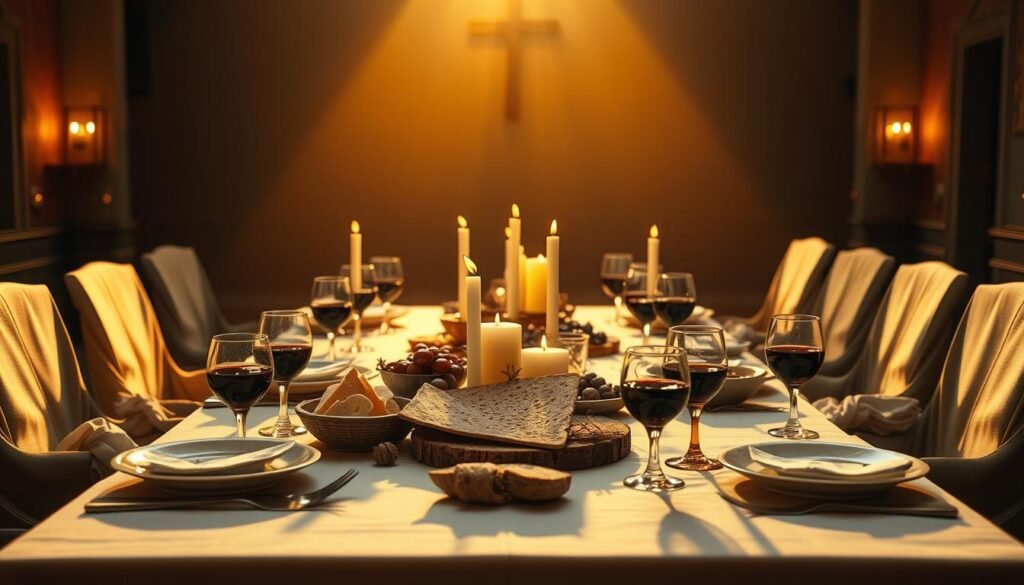
Modern Adaptations of Passover for Christians
Passover has changed a lot in Christian communities. Many churches now celebrate it in new ways. They honor Jewish traditions and see how Jesus fulfilled them. This makes people feel closer to their spiritual roots.
Christian Seder Services and Their Importance
Christian Seder services are key in this new way of celebrating. They let people join a ritual full of history. It’s a chance to connect with the Jewish heritage and see how Jesus’ death relates to Passover.
At these services, each item on the Seder plate has a special meaning. It helps people remember and think deeply about their faith.
Various Organizations Promoting Christian Passover
Many Christian groups are working to spread the word about Passover. They want to teach people why this tradition matters. Groups like Jews for Jesus show how Judaism and Christianity are connected.
They use resources, events, and learning materials to help people understand and join in Christian Seder services.
Theological Concerns Regarding Observing Passover
Observing Passover brings up many theological questions among scholars and church leaders. They say the practice, though meaningful, has changed a lot because of Christ’s sacrifice. The debate is whether we should celebrate Passover as it was before, considering Jesus’ teachings.
Understanding the Fulfillment of Passover in Christ
In Christian beliefs, Jesus’ sacrifice changes how people see Passover. Many believe Jesus is the ultimate Lamb, making the old rituals less important. Colossians 2:16-17 suggests that these rituals are not needed for Christians anymore.
Now, Passover is seen more deeply through the Lord’s Supper. This connects us to Jesus’ last meal and His sacrifice for us.
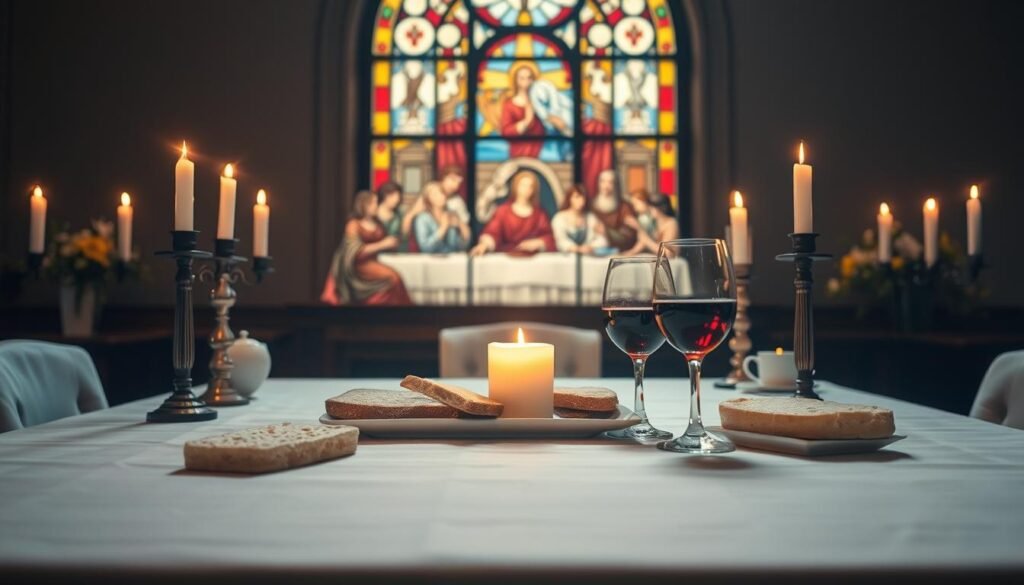
Confusion Surrounding Christian Observance of Passover
There’s a big difference between how Passover was celebrated long ago and how it’s celebrated now. In the past, Passover was all about following biblical commands. But today, it has mixed in many cultural traditions. This mix-up can make it hard for Christians to understand the real meaning of Passover.
The Difference Between Ancient and Modern Celebrations
Long ago, Passover was a big deal, tied to the story of the Israelites’ freedom. Now, it’s not the same. Modern celebrations often add new things that weren’t part of the original tradition. This change can make people misunderstand what Passover is really about.
It’s important for Christians to remember the old ways to get the true story of Passover.
Potential Misunderstandings in Symbolism
The symbols of Passover are very important. They tell the story of salvation and freedom. But if these symbols get mixed up with new ideas, their true meaning can get lost. Christians should be careful not to lose sight of the deep spiritual meaning of Passover.
Christian Heritage and Jewish Roots
The link between Christian heritage and Jewish roots is very important. Early Christians, who were often Jewish, kept key parts of their faith. They celebrated festivals, followed food laws, and did rituals that were important to them. These traditions helped shape what would become mainstream Christianity.
The Early Church and its Jewish Background
The early church was closely tied to the Jewish faith. It was a lively community that kept its traditions while accepting Jesus’s teachings. Apostles like Peter and Paul worked within this Jewish framework, linking Jewish beliefs with the new covenant through Christ. This story helps us see how Christian practices started and changed over time.
Rediscovery of Jewish Practices in Christianity Today
Recently, there’s been a big interest in Jewish practices within Christianity. Many believers are looking into Jewish festivals, rituals, and customs. They see how these have shaped Christian theology and worship. This interest shows a deeper respect for the historical bond between Christian and Jewish faiths. It leads to a richer spiritual life and a better grasp of the faith’s roots.
FAQ
Can Christians celebrate Passover?
Yes, Christians can celebrate Passover if they want to. It’s based on their beliefs and desire to connect with its deep history and spiritual meaning. This includes understanding Christ’s sacrifice.
What is the biblical significance of Passover?
Passover is a key event in the Old Testament. It tells the story of the Israelites’ freedom from Egypt. It also points to Jesus Christ, seen as the “Lamb of God,” linking Judaism and Christianity.
Why is the first Passover important?
The first Passover is crucial for Jewish identity. It shows God’s salvation and sets a tradition of remembering for future generations.
How do different Christian denominations view Passover?
Christian groups have different views on Passover. Some see it as a way to deepen spiritual understanding by observing it. Others believe Christ’s sacrifice is enough, leading to varied practices.
What role does the Seder play in the Last Supper?
The Last Supper was deeply connected to the Passover Seder. This set the stage for Jesus’ teachings and the start of the Eucharist. The Seder rituals highlighted Jesus as the sacrificial Lamb.
What are Christian Seder services?
Christian Seder services blend Jewish traditions with Christ’s fulfillment. They help congregations explore their spiritual heritage and connect Christianity and Judaism more deeply.
Are there theological concerns regarding celebrating Passover today?
Some theologians worry about celebrating Passover because of Christ’s fulfillment. They think the feast’s sacrificial aspect is outdated. They see Passover’s true meaning in the Lord’s Supper.
What confusions arise in Christian observance of Passover?
Confusion comes from the gap between ancient and modern Passover celebrations. Today’s practices often differ from the original, causing confusion about their symbols and spiritual meaning.
How does Christianity relate to its Jewish roots?
Early Christianity was deeply tied to Judaism. Today, Christians are rediscovering their Jewish heritage. This helps them value their roots and historical context.

Rockin’ the faith, one verse at a time!
Growing up, the Bible’s stories deeply impacted me. Now, with over 15 years of preaching experience, I blend timeless teachings with modern technology, making them relevant for today’s world.
Bible Hub Verse is my platform to share historical insights and thought-provoking articles, exploring both familiar and uncommon Christian topics. My passion is building a welcoming online space for everyone to learn, grow in their faith, and discover the Bible’s enduring message.
Join the journey!
God bless you.

